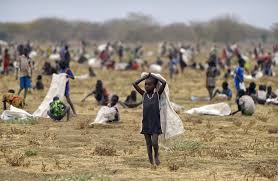The massive influx of returnees and refugees fleeing conflict in Sudan is intensifying pressure on South Sudan, “an already fragile country,” according to UN agencies.
Since fighting broke out in April 2023 between the Sudanese army and the paramilitary Rapid Support Forces (RSF), many Sudanese have chosen South Sudan as a refuge.
However, if the situation persists, around 60 percent of the South Sudanese population is likely to face acute food
insecurity during the 2025 lean season, UN agencies warned on Monday.
Returnees, as well as young children, face alarming levels of hunger and malnutrition. These challenges are exacerbated by economic pressures, recurring climate shocks and the spillover effects of conflict in neighbouring Sudan.
According to UN agencies, an estimated 7.69 million people will be in Crisis (IPC Phase 3) or worse in 2025. Of these, 2.53 million could reach Phase 4 (Emergency), and 63,000 people could be in Phase 5 (Catastrophe).
The influx of returnees and refugees fleeing conflict in Sudan is exacerbating the situation and increasing pressure on South Sudan, “an already fragile country,” the world’s youngest to gain independence in 2011.
“Year after year, we see hunger reaching some of the highest levels we have ever seen in South Sudan, and when we look at the areas where food insecurity levels are highest, it is clear that a cocktail of desperation – conflict and climate crisis – is the main driver,” said Mary-Ellen McGroarty, World Food Programme (WFP) Country
Representative.
Between September and November 2024, the UN estimates that 6.3 million people (47% of the population analysed) are in critical or catastrophic levels of food insecurity. Children are among the most vulnerable, with 2.1 million at risk of malnutrition, up from 1.65 million previously.
“Malnutrition is the end result of a series of crises, the most notable for South Sudan being poor sanitation and the prevalence of water-borne diseases, as well as severe food insecurity,” said Hamida Lasseko, UNICEF Representative in the East African country.
UNICEF expressed deep concern about the worsening conditions for children and mothers, calling for immediate action.
This means addressing these root causes, alongside “providing immediate nutritional support to treat malnutrition in children who are at greater risk of death,” she warned.
ODL/Sf/te/fss/as/APA


